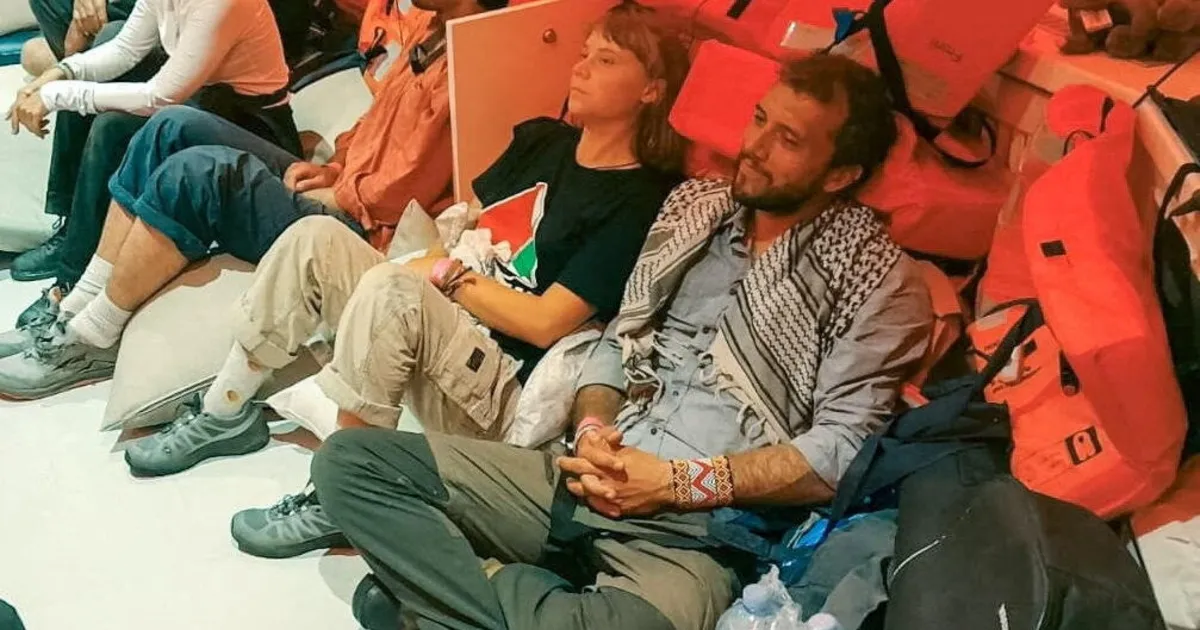
On Thursday, Israeli navy forces boarded the majority of the vessels in a flotilla attempting to break Israel's blockade of Gaza, detaining numerous activists and several European lawmakers. This operation has sparked significant condemnation from around the world. The organizers of the Global Sumud Flotilla reported that one boat managed to sail close to Gaza’s coast but lost communication with the vessel early Thursday morning. According to the flotilla organizers, 39 boats were intercepted or are presumed to have been intercepted as contact with the activists was lost during the Israeli operation that commenced the night before.
Israel’s foreign ministry assured that the activists, including well-known Swedish climate campaigner Greta Thunberg, were safe and being transported to Israel. In a statement on social media, the ministry indicated that the activists and their vessels would be arriving peacefully in Israel, where deportation procedures to Europe would begin. The Global Sumud Flotilla consisted of nearly 50 boats and around 500 activists aiming to deliver a symbolic amount of humanitarian aid to the people of Gaza.
The flotilla featured notable figures such as Mandla Mandela, grandson of Nelson Mandela, former Barcelona Mayor Ada Colau, and several European lawmakers. The group expressed its determination to challenge the Israeli blockade of Gaza and provide essential aid to the Palestinians. An American military veteran, Greg Stoker, on board the vessel Ohwayla, reported that around a dozen Israeli naval vessels approached them early Thursday, demanding they turn off their engines or face consequences. In a shaky Instagram video, Stoker detailed the tense situation.
Activists reported that Israeli forces employed water cannons against some boats during the encounter. The Israeli Foreign Ministry released a video on X showing Thunberg on the ship's deck receiving a water bottle and raincoat. Italy's Foreign Minister Antonio Tajani announced on RAI that the boats would be towed to Israel's port of Ashdod, and the activists would face deportation in the following days, stating that Israeli forces had been instructed not to use violence.
In a troubling development, some flotilla vessels were reportedly attacked by drones while docked off Tunisia and later while sailing near Greece. These drone strikes ignited fires on two boats in Tunisian waters, with Tunisian authorities confirming an investigation into at least one attack as deliberate. However, neither Tunisia nor Greece has assigned responsibility for these attacks, and the Israeli military did not respond to CBS News’ inquiries.
Turkey's Foreign Ministry condemned the interception, labeling it an act of terrorism and a serious violation of international law. The ministry is taking steps to ensure the immediate release of Turkish citizens and other passengers detained by Israeli forces. Colombian President Gustavo Petro stated he would expel Israel's diplomatic delegation if the military intercepted the flotilla, labeling Israel's actions as genocide.
Malaysian Prime Minister Anwar Ibrahim also criticized the interception, noting that Israeli forces had detained eight Malaysians. He emphasized that by blocking this humanitarian mission, Israel demonstrated a blatant disregard for the rights of the Palestinian people and for global conscience. European governments, including Spain and Italy, which had dispatched navy ships to escort the flotilla, urged activists to turn back to avoid confrontation. However, Spain's Prime Minister Pedro Sánchez defended the humanitarian mission, stating that it would not have been necessary had Israel allowed aid into Gaza.
The vessels were sailing in international waters just north of Egypt, having entered what activists termed a danger zone. This area has historically been where the Israeli navy intercepted other boats attempting to breach the blockade. Despite warnings, activists resumed their journey, broadcasting their voyage live and holding up messages of solidarity with Gaza.
Experts on international law note that while Israel claims the blockade of Gaza is militarily justified, the legality of such actions remains contentious. The U.N. Convention on the Law of the Sea stipulates that a state can only exert jurisdiction up to 12 nautical miles from its shore, and typically, states cannot seize ships in international waters unless under armed conflict. Omer Shatz, an Israeli international law expert, asserted that even if the blockade is deemed lawful, international law supports the passage of humanitarian aid.
As the situation unfolds, activists and supporters of the flotilla maintain that their mission is peaceful and intended solely to provide humanitarian relief to those in need in Gaza. The response from the international community continues to evolve as calls for the release of detained activists grow louder.